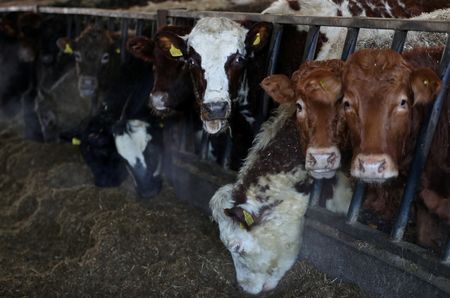LONDON (Reuters) – Britain’s farmers union gave Thursday’s U.S.-UK economic deal a mixed reception, welcoming the retention of British food standards on U.S. imports and reciprocal market access for beef, but flagging concern over a removal of tariffs on bioethanol.
The deal gave UK farmers a U.S. quota for beef of 13,000 metric tonnes, which the National Farmers Union said was a positive. Under the deal, U.S. farmers will have the same quota for sales into Britain.
Crucially there will be no weakening of UK food standards on U.S. beef imports, which was a red line for the union and an election manifesto pledge for the Labour government. That means U.S. beef bred with growth hormones still won’t be allowed into the UK.
“We appreciate the government’s efforts in listening to our concerns, particularly around maintaining high standards, protecting sensitive agricultural sectors and securing reciprocal access for beef,” NFU President Tom Bradshaw said.
Brooke Rollins, U.S. Secretary of Agriculture, said the deal would “exponentially increase” U.S. beef exports to Britain.
However, with little price differential between British produced beef and U.S. beef that does meet UK standards, the U.S. product could struggle to find a UK market.
Finding favour with the UK consumer may also be a tough task. Currently 100% of the fresh beef sold by Britain’s two biggest supermarket groups – Tesco and Sainsbury’s – is British and Irish.
Bradshaw also said he was concerned that the U.S. had been given full access to Britain’s market for bioethanol, which is used to produce beer.
“Two agricultural sectors have been singled out to shoulder the heavy burden of the removal of tariffs for other industries in the economy,” he added.
(Reporting by James Davey and Sachin Ravikumar; editing by William James)








